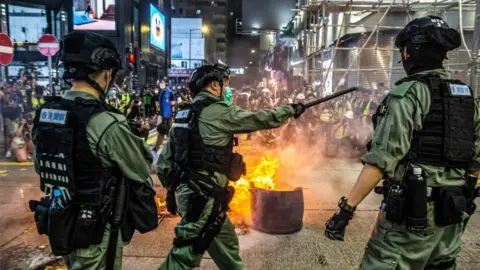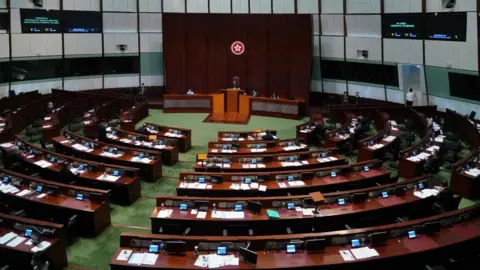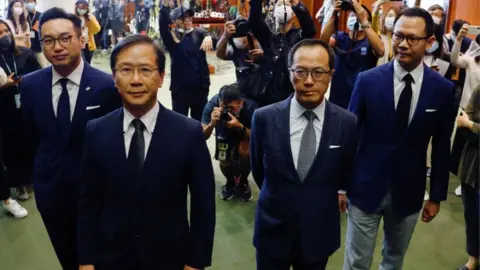Hong Kong pro-democracy lawmakers resign after China ruling
All of Hong Kong's pro-democracy lawmakers have announced their resignation after Beijing forced the removal of four of their colleagues.
On Wednesday Beijing passed a resolution allowing the city's government to dismiss politicians deemed a threat to national security.
The opposition lawmakers then said they would leave in solidarity.
For the first time since Hong Kong was handed back to China in 1997 the body has almost no dissenting voices.
BBC China correspondent Stephen McDonnell says the legislature was already stacked in favour of the pro-Beijing camp.
The dismissal of the four legislators is viewed by many as the latest attempt by China to restrict Hong Kong's freedoms - something Beijing denies.
Democratic Party chairman Wu Chi-wai told reporters following the lawmakers' removal: "We can no longer tell the world that we still have 'one country, two systems', this declares its official death."
Hong Kong - formerly a British colony - was returned to China under the "one country, two systems" principle, which allowed it to retain more rights and freedoms than the mainland until 2047.
But in late June China passed a controversial, far-reaching national security law in the territory after years of pro-democracy and anti-Beijing protests, which reduced Hong Kong's autonomy and made it easier to punish demonstrators.
Why did the lawmakers resign?
The city's pro-democracy legislators had 19 seats in the 70-seat legislature. All those members have now left - either by resigning or by being dismissed.
The new resolution passed by China's National People's Congress Standing Committee on Wednesday says that lawmakers should be disqualified if they support Hong Kong independence, refuse to acknowledge China's sovereignty, ask foreign forces to interfere in the city's affairs or in other ways threaten national security.
It also allows the Hong Kong government to directly remove lawmakers without having to approach the courts.
Moments after that resolution passed, four lawmakers - Alvin Yeung, Kwok Ka-ki and Dennis Kwok of the Civic Party and Kenneth Leung of the Professionals Guild - were dismissed.
All four of them are considered moderates and they have never supported Hong Kong independence.
"If observing due process and fighting for democracy can lead to being disqualified, it [disqualification] will be my honour," Dennis Kwok said.
 AFP
AFP"We... will stand with our colleagues who are disqualified. We will resign en masse," Wu Chi-wai said. The 15 lawmakers' letter of resignation will be submitted on Thursday.
Two opposition lawmakers remain in the legislature - Cheng Chung-tai from the Civic Passion party and Pierre Chan, a medical doctor and lawmaker.
Chinese foreign ministry spokesman Wang Wenbin said the disqualification of the four lawmakers was "rational, reasonable and in line with the constitution and laws".
"This was a necessary requirement for adhering to and improving on 'one country, two systems,' implementing Hong Kong's Basic Law, as well as Hong Kong's National Security Law," he said at a news conference in Beijing.
But others have criticised the move. UK Foreign Secretary Dominic Raab called the Chinese resolution "a further assault on Hong Kong's high degree of autonomy and freedoms under the UK-China Joint Declaration".
"This campaign to harass, stifle and disqualify democratic opposition tarnishes China's international reputation and undermines Hong Kong's long-term stability."
Human rights organisation Amnesty International has also condemned the resolution. "Bulldozing through arbitrary decisions via the Chinese government makes a mockery of the rule of law," Asia-Pacific regional director Yamini Mishra said.
 Getty Images
Getty ImagesThe territory's leader, Chief Executive Carrie Lam, is pro-Beijing and is supported by the central government there.
Speaking to the media, Ms Lam said the four council members who were disqualified had already failed to meet the requirements to stand in the now postponed elections next year.
She added that although she "welcomes diverse opinions in the Legislative Council" these had to be expressed "in a responsible manner".
South China Morning Post newspaper quoted Ms Lam as saying no by-elections would be held in the four now vacant seats as legislative elections were only nine months away.

The Chinese government and its surrogates in Carrie Lam's administration have - in recent times - used specific problems as a series of excuses to introduce wholesale, Draconian changes which will remain in place long after whatever hurdle it is has been cleared.
In this case, four legislators had, controversially, been ruled ineligible for the next Legislative Council election.
However, because the term of the current legislature had been extended for a year, due to a delayed vote, they had been able to remain in their existing positions.
 Reuters
ReutersCarrie Lam wanted them gone straight away so she says she asked Beijing to introduce a new law enabling their immediate dismissal.
In reality, who knows whether Hong Kong's leader requested this move or was told it was going to happen by the Communist Party's senior leadership?
Either way, now the city government has been empowered to remove any pro-democracy politician who is seen to have acted with insufficient loyalty to the motherland in the future.
Crucially, the courts can be bypassed under the new rules and, now that the Hong Kong government has said that the concept of the separation of powers has never actually applied in the city, the executive branch is able to dismiss members of the legislature and their view is that this is not really anything to worry about.

What's been happening in Hong Kong?
As a Special Administrative Region, Hong Kong was to have its own legal system, multiple political parties, and rights including freedom of assembly and free speech.
But the new security law for the city passed in response to months of pro-democracy protests criminalised "secession, subversion and collusion with foreign forces".
Beijing said the law will return stability to the territory, but critics said it effectively curtails freedom of speech and protest.
After the introduction of the security law the UK offered Hong Kong residents still holding British National Overseas (BNO) status a route to British citizenship.
Around 300,000 people currently hold BNO passports, while an estimated 2.9 million people born before the handover are eligible for one.
China last month strongly criticised the UK in response, telling London to "immediately correct its mistakes".
